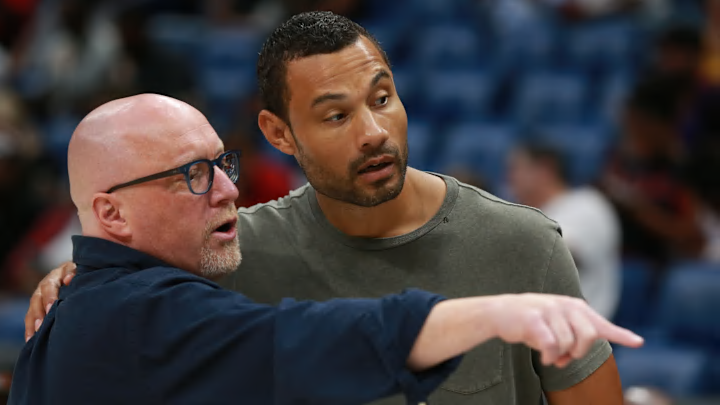The New Orleans Pelicans went from one of the most promising teams in the NBA to a dumpster fire and Trajan Langdon got a front-row seat while it happened as GM. Now as team president of the Detroit Pistons he knows exactly how to avoid the same fate in the Motor City.
The Pelicans once had a team stacked with young talent, complementary veterans and a ton of draft capital. It looked like New Orleans had the potential for a sustainable title contender with Zion Williamson, Brandon Ingram, Lonzo Ball, Jrue Holiday and others, but it all fell apart and eventually led to the firing of David Griffin a year after Langdon smartly jumped ship to run the Pistons.
The Pels are now being run by Joe Dumars and Troy Weaver, who inherited a wonky, injured and ill-fitting roster and inexplicably gave away the last draft pick leftover from the Jrue Holiday haul to select Derik Queen, who is already injured. The Pels are probably not a playoff team and now don’t have a draft pick in 2026. Ouch.
So how did this team devolve so quickly?
Availability is the best ability, a cliche Trajan Langdon knows well
I hate this cliche, but these sayings become part of the canon for a reason, and no one knows this one better than David Griffin and Trajan Langdon, who tried to build a team around three injury-prone players.
Everyone knows about Zion, but Lonzo Ball and Brandon Ingram were also unreliable, and the three of them rarely ever shared the floor at the same time, as at least one of them was always injured.
The Pelicans eventually cut bait with Lonzo, but kept Zion and BI, hoping for better injury luck that they didn’t get. The Pels were eventually forced to trade Ingram for a lowball return and suddenly the promise of one of the best young trios in the league was reduced the oft-injured Zion.
Trajan Langdon has made it a point to target players who don’t miss a lot of games, and it showed last season, as the Pistons had good injury luck outside of the freak injury to Jaden Ivey.
Tobias Harris, Malik Beasley and Tim Hardaway Jr. all fit that mold, as does Duncan Robinson, who has played in 70 more games four out of his six full seasons in the league.
LeVert did have some injury issues earlier in his career, but he’s played 64, 68 and 74 games over his last three seasons and is only on a two-year deal that won’t kill the Pistons.
Langdon knows you can’t have key players who are constantly hurt, and he’ll continue to value that quality in future acquisitions.
Avoiding long-term deals for veterans
The Pistons are clearly building around their young core. Cade Cunningham has already gotten his big deal, and Jaden Ivey, Jalen Duren and eventually Ausar Thompson are on deck.
If they keep all of these guys it means precious little cap space for complementary role players, so Langdon has stayed fluid by only signing them to short-term deals. He hasn’t gone beyond two years with any of them and got Malik Beasley on a one-year deal that only cost the team $6 million.
The Pels made the error with the CJ McCollum extension, turning a good player into a negative financial asset, as no one wants to pay him $30 million when he’s 34 years old.
The Pels ended up trading him in another inexplicable move for Jordan Poole, trading one problem for a worse one by taking on an extra year of salary. Sorry, Pels fans.
Trajan Langdon is applying the lessons he learned to the Pistons, who have avoided injury-prone players and bad contracts so far.
